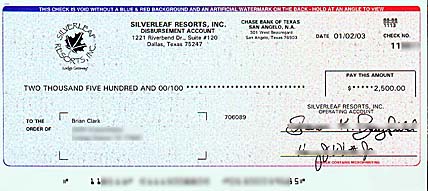
If you would like to buy a time-share then Silverleaf wants to talk to you. I didn't want to. But they just didn't seem to get it.
|
The Story:
|
 |

|
If you would like to buy a time-share then Silverleaf wants to talk to you. I didn't want to. But they just didn't seem to get it.
|
The Calls
Upon moving to my new domicile, I received telemarketing calls the within a day or two of having my new phone. I felt so welcome--it was just like home!
Grad school, being fairly demanding in terms of time, put an end to my crusade for justice, at least temporarily. I had to go into retirement if I wanted to pass my classes. But I still kept records, and one of them was this call from Silverleaf Resorts, which I received on July 19, 2000. Needless to say, I asked to be put on their DNC list. On September 20, 2000, they called again. This time, I asked to be put on their DNC list and also asked for a copy of their DNC policy. I gave them my address and never received the copy of their DNC policy.
Since they had called within a year of my DNC request, the door was open for me to go after them. But grad school took ALL of my time. I decided that it would take a completely blatant disregard of the law and my time to get me to fight back before graduation. Two years passed, and the new depths to which telemarketers sunk pushed me over the edge again. Yes, the prerecorded solicitation, which is patently illegal was now in vogue. I was bombarded by a deluge of prerecorded calls, and among the culprits was Silverleaf. Since I already had a history with Silverleaf, I decided they would get the honor of bringing me out of retirement, and they should be especially proud, since I haven't graduated yet.
The Demand Letter
One thing I learned from Convergys is that a well-written letter might make them take me more seriously than a phone call to their legal department.
Another thing I learned during my time with Convergys is that multiple violations often occur during phone calls. I decided to add them up, and believe me--I was being generous.
What follows is the demand letter I sent to Silverleaf Resorts via certified mail:
Robert E. Mead
Chairman of the Board/Director
Silverleaf Resorts, Inc
PO Box 358
Suite 120, 1221 Riverbend
Dallas, TX 75247
Dear Mr. Mead:
On July 19, 2000 at approximately 5:30 pm, I received a call from a live telemarketer who identified herself only as "Camille" for Silverleaf Resorts. I asked to be put on their DNC (Do Not Call) list. She read my number back to me and said she would put it on the DNC list. I was not given a contact phone number or address. I will refer to this as the First Call.
On September 20, 2000 at approximately 6:06 pm, I received a second call form Silverleaf Resorts, this time from someone who identified himself only as "Mason". I again asked to be put on DNC list and asked them to send me a copy of the DNC policy. The manager took my address, but I never received a copy of the policy. I did get a phone number (214 630-1951, xt15337), though it has since been disconnected. I will refer to this as the Second Call.
On November 7, 2002 at approximately 12:08 pm, I received a pre-recorded call asking me to verify my income, age, and marital status. This recording stated that P&M Consulting was placing the call. I was given no opportunity to speak to anyone, so was forced to answer the survey in order to get information about the company. When I answered the questions, I was not treated to an operator; instead the recording said that someone would contact me, and that the company address was 301 Duck Road, Grandview, MO 64030. I will refer to this as the Third Call.
On November 13, 2002 at approximately 3:35 pm, I was contacted by someone who identified herself only as "Melissa." She said that she was calling as a result of my "participating" in their survey, and said that Silverleaf was the company who placed the call, and based upon my responses, invited me to attend a sales pitch. She also said there was no number I could call to contact Silverleaf without agreeing to attend a sales pitch. I will Refer to this as the Fourth Call.
On November 19, 2002 at approximately 1:40 pm, I was contacted for a second follow-up from the November 7 call. The caller identified himself as "John Callison" (spelling unconfirmed). This call was identical in purpose to the November 13 call, and during this call, John admitted that Silverleaf hired P&M Consulting to telemarket on Silverleaf's behalf. When I asked for a phone number for Silverleaf, John had none for me, and suggested that I try the phone book. I asked again to be placed on Silverleaf's DNC list. I will refer to this as the Fifth Call.
I count the following violations according to 47 CFR §64.1200 Subpart L:
| 1. First Call: I was not given a contact telephone number or address | §64.1200(e)(2)(iv) |
| 2. First Call: My number was not added to the DNC list | §64.1200(e)(2)(iii) |
| 3. Second Call: Failure to honor DNC request | §64.1200(e)(2)(vi) |
| 4. Second Call: My number was still not added to DNC list | §64.1200(e)(2)(iii) |
| 5. Second Call: Didn't send requested DNC policy | §64.1200(e)(2)(i) |
| 6. Third Call: Pre-recorded Message is itself a violation | §64.1200(a)(2) |
| 7. Third Call: Failure to honor DNC request | §64.1200(e)(2)(vi) |
| 8. Fourth Call: Failure to honor DNC request | §64.1200(e)(2)(vi) |
No prior business relationship existed between Silverleaf and myself, and I never gave consent to be called.
The TCPA establishes a private right of action for telephone subscribers who receive such calls. §227(b)(3) of the TCPA provides:
"(3) PRIVATE RIGHT OF ACTION.--A person or entity may, if otherwise permitted by the laws or rules of court of a State, bring in an appropriate court of that State--
(A) an action based on a violation of this subsection or the regulations prescribed under this subsection to enjoin such violation,
(B) an action to recover for actual monetary loss from such a violation, or to receive $500 in damages for each such violation, WHICHEVER IS GREATER, or
(C) both such actions.
If the court finds that the defendant willfully or knowingly violated this subsection or the regulations prescribed under this subsection, the court may, in its discretion, increase the amount of the award to an amount equal to not more than 3 times the amount available under subparagraph (B) of this paragraph." [emphasis added]
The term "willful"as defined in the Communications Act §312(f), does not require an intent to violate the law, only an intent to commit or omit the act in question. Given Silverleaf's recent citation by the Federal Communications Commission for placing pre-recorded calls, I am confident that I can demonstrate that violation number six was willfully and/or knowingly committed, if not all of the violations. I intend to file in court for $500 for each violation, and I will press for treble damages for violation number six, based on the fact that Silverleaf knowingly/willfully placed a pre-recorded call. This brings the amount to a total of $5000.
In the event that you would prefer to resolve this matter without court fines and attorney's fees, you may remit the sum of $2500 to the address above. In exchange, I will forgive the violations that occurred on or before today, November 21, 2002, with the stipulation that my Do Not Call Requests remain entered in your system. If I have not heard from you by 5:00 pm on December 10, 2002, I will initiate a civil procedure, and my offer of settlement will be withdrawn. Thank you for your attention in this matter.
Sincerely,
Brian Clark
The FCC Citation
The Federal Communications Commision is a government agency that regulates, among other things, telemarketing. They don't actually make the laws--they recommend to Congress and they enforce the laws. Here is an instance where there were so many complaints about Silverleaf's prerecorded calls that the FCC actually issued a Citation, which was conveniently issued BEFORE they hit me with their prerecorded call. In other words, after a stern government warning, Silverleaf continued. I mentioned this in my demand letter to gently remind them they are already in trouble with the government, and I know it and wouldn't hesitate to tell the judge. I also filed a complaint with the FCC wich was essentially the same as my demand letter, with the exception that I wasn't demanding money--just spelling out exactly what happened. I actually got a response very quickly, and they asked me to update them if anything else happened.
This goes to show that any violations should be reported to the FCC. I think there are enough pissed-off citizens out there that the FCC will actually take action.
Well, that's the story so far... My biggest demand ever. It will be interesting to see if they're smart enough to take the $2500 escape route instead of risking the $5000 + legal fees. But they CAN'T be as dumb as Convergys.
Can they?
One thing is certain: I will NOT settle for less than what my demand letter asked for. And if I have to actually file a suit, $2500 won't cut it. I've been too nice (financially, at least) to these people.
The Conclusion
1/10/03
Happy New Year!
Well, Silverleaf was professional, quick, and as little nonsense as one could hope. They accepted my invitation to settle for $2500 and admitted no guilt.
Ask their accountant how guilty they are.
Dear reader,
I'm sorry (ok, not really) if this was not as exciting as Convergys. I'm happily moving on.
Brian